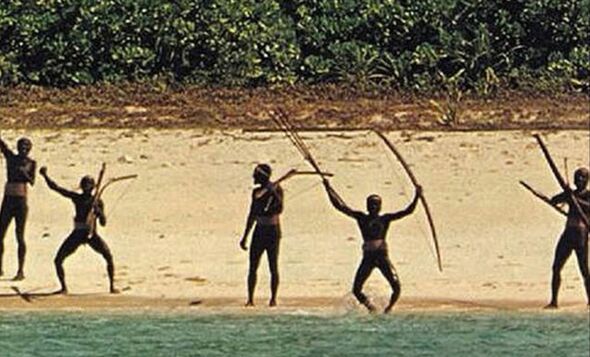World
Access Forbidden: Uncovering North Sentinel Island’s Isolation

Hidden in the Bay of Bengal, North Sentinel Island remains one of the last places on Earth where a tribe lives in complete isolation from modern society. The Indian government has prohibited visits to this small island, deeming it dangerous. The indigenous people, known as the **Sentinelese**, fiercely defend their territory and remain largely cut off from outside influence.
The **Sentinelese** belong to the broader group of **Andamanese** peoples. Reports indicate that the tribe has had minimal contact with outsiders and displays hostility toward any who approach their shores. In **1956**, the Indian government declared North Sentinel a tribal reserve, enforcing a three-nautical-mile exclusion zone around it. Photography is strictly prohibited, although some individuals have managed to capture images from a distance.
Estimates of the tribe’s size vary widely, ranging from **35** to **500** members. Historical accounts, including those from the 13th-century explorer **Marco Polo**, describe the Sentinelese as “a most violent and cruel generation who seem to eat everybody they catch.” Such descriptions highlight the tribe’s long-standing reputation for defending their isolation.
Researchers have noted that the **Sentinelese** maintain a hunter-gatherer lifestyle, utilizing spears, bows, and arrows for hunting. They also employ simple methods to catch seafood, primarily shellfish and mud crabs. Agriculture is not practiced, and their diet consists mainly of the resources available in their environment. The tribe’s physical characteristics, such as height—estimated between **5 ft 3** and **5 ft 5**—and muscle tone have been noted during rare aerial surveys, which show no signs of obesity.
In **November 2018**, the situation escalated dramatically when **John Allen Chau**, a 26-year-old American missionary, was killed after attempting to contact the tribe. He travelled to the island without seeking the necessary permits and made several visits before local fishermen reported seeing the tribe dragging his body along the shore. This incident underscored the dangers associated with interacting with the **Sentinelese** and raised questions about the ethics of contact with isolated groups.
A notable incident occurred in **August 1981**, when the crew of the **MV Primose** found themselves stranded near the island while transporting chicken feed from Bangladesh to Australia. The ship ran aground, and the captain sent a distress call after observing more than **50** armed **Sentinelese** preparing to board. The crew managed to escape after several days, protected by strong waves that prevented the islanders from reaching them.
Most recently, in **March 2023**, a 24-year-old American social media influencer, **Mykhailo Viktorovych Polyakov**, made an unauthorized landing on North Sentinel Island. He was arrested by the **Indian Police Service**, and his actions were condemned by the indigenous rights organization **Survival International**. They emphasized the dangers that contact poses to uncontacted peoples, who are particularly vulnerable to diseases for which they have no immunity. Reports indicated that Polyakov left behind a **Diet Coke** and a coconut as “offerings” to the Sentinelese.
The **Sentinelese** continue to live in their traditional way, utilizing temporary huts made from local materials. Men typically wear minimal clothing, adorned only with simple ornaments like necklaces and headbands. Their isolation not only protects their way of life but also raises ongoing ethical discussions regarding the rights of indigenous peoples and the responsibilities of outsiders.
The unique circumstances surrounding North Sentinel Island serve as a reminder of the delicate balance between preservation and intrusion. As the world continues to evolve, the fate of the **Sentinelese** remains a significant point of interest for anthropologists, human rights advocates, and those who respect the autonomy of isolated communities.
-

 Health3 months ago
Health3 months agoNeurologist Warns Excessive Use of Supplements Can Harm Brain
-

 Health3 months ago
Health3 months agoFiona Phillips’ Husband Shares Heartfelt Update on Her Alzheimer’s Journey
-

 Science2 months ago
Science2 months agoBrian Cox Addresses Claims of Alien Probe in 3I/ATLAS Discovery
-

 Science2 months ago
Science2 months agoNASA Investigates Unusual Comet 3I/ATLAS; New Findings Emerge
-

 Science1 month ago
Science1 month agoScientists Examine 3I/ATLAS: Alien Artifact or Cosmic Oddity?
-

 Entertainment5 months ago
Entertainment5 months agoKerry Katona Discusses Future Baby Plans and Brian McFadden’s Wedding
-

 Science1 month ago
Science1 month agoNASA Investigates Speedy Object 3I/ATLAS, Sparking Speculation
-

 Entertainment4 months ago
Entertainment4 months agoEmmerdale Faces Tension as Dylan and April’s Lives Hang in the Balance
-

 World3 months ago
World3 months agoCole Palmer’s Cryptic Message to Kobbie Mainoo Following Loan Talks
-

 Entertainment2 months ago
Entertainment2 months agoLewis Cope Addresses Accusations of Dance Training Advantage
-

 Science1 month ago
Science1 month agoNASA Scientists Explore Origins of 3I/ATLAS, a Fast-Moving Visitor
-

 Entertainment4 months ago
Entertainment4 months agoMajor Cast Changes at Coronation Street: Exits and Returns in 2025









